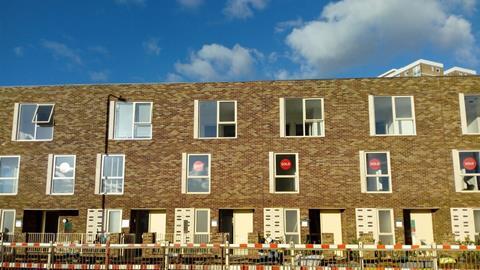As prices stall some organisations are flipping for sale homes into rental

Housing association surpluses are starting to feel the effect of flatlining house prices, with the potential to hit organisations’ ability to invest in building homes for social rent.
Proceeds from private sales are used by such organisations in cross-subsidy arrangements to support investment in a range of activities.
But with house prices coming under pressure some associations are reporting lower surpluses.
In part this is due to fewer private sales of new homes and in some instances a number being flipped into rented accommodation, potentially reducing investment in other tenures.
Metropolitan Thames Valley Housing (MTVH) this week reported an operating surplus of £154m last year, down 5%, on turnover of £411m, marginally down on the previous year’s £414m.
And Peabody, which published its annual report last week, said its 2019 operating surplus before financing costs fell 18% to £172m, on turnover of £562m, down 7%.
MTVH said it didn’t switch tenures on any homes for private sale in the past year, but Ian Johnson, the group’s chief financial officer, acknowledged it had been a challenging time for sales across the sector due to “economic uncertainty in the market”.
However he said the group remained committed to creating a social housing subsidy through the market sale of homes.
At 119 units MTVH sold fewer homes built for private sale in the past year than planned, but Johnson argued the organisation wasn’t in a high-risk position. “And we have not seen a dramatic drop in house prices, particularly at our price points, and outside London, where they have by and large held up”.
Johnson said the business was “fully stress-tested…and we are comfortable that we have the financial strength to fulfil all of our commitments and deliver our plans. We also have options available to us, such as changing stock tenure to manage sales exposure if necessary.”
In its latest report Peabody, which operates 66,000 homes in London and the south east, said of the £39m fall in its operating surplus £16m was the result of fewer new build sales, while fewer sales from its existing portfolio resulted in a further £18m shortfall.
Peabody said its private sale margin had fallen by two percentage points, but the decrease had been expected and reflected the product mix.
Publishing its latest annual figures Sovereign, the housing association which owns and manages nearly 60,000 homes in the south of England, said its operating surplus rose 2% to £140.3m in 2018/19 on turnover of £402m, up 6%.
Within that surplus figure was a decrease in proceeds from private sale activity, down from £4.1m to £3.9m.
And as Brexit loomed – deal or no-deal – Sovereign said it had already taken action to stockpile maintenance components and was “ready to respond to adverse circumstances should they arise”.










No comments yet